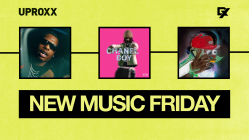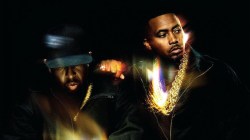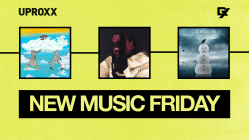Alexander Woods, known as Big Scarr, was just a few months shy of his 23rd birthday when he died of an accidental drug overdose. The South Memphis rapper had a booming, raspy voice, a grown-up croak usually reserved for a lifetime of hard living. He carried himself with a particular heaviness, often rapping with a muted, dissociated tone. Scarr’s short life was marked with tragedy: He and his eight siblings lived with his grandmother until she passed from lung cancer when he was 13. At 16, Scarr got his nickname from injuries to his face after flying through the windshield during an intense car accident. At 20, he sustained a gunshot to the hip, but the bullet traveled into his abdomen, nearly killing him.
Scarr’s brief career began in earnest after cousin Pooh Shiesty hipped 1017 head honcho Gucci Mane to Scarr’s talent. “SoIcy Boyz,” a morose but chugging street anthem that featured Shiesty and Foogiano, introduced him to the wider rap universe. Amidst the dour acoustic guitar samples and mean-mugging 808s, Scarr more than held his own with two of 1017’s biggest personalities, cementing his status as an artist on a rapid ascent. He mapped out his approach on his first two tapes, Big Grim Reaper and its subsequent deluxe version, Big Grim Reaper: The Return: A hypnotic version of classic Memphis trunk music equally informed by spacey Atlanta trap, early 2010’s Chicago drill, and the wild-eyed frenzy of contemporary Michigan rap. Suffice it to say, the music is dark.
The Secret Weapon, released just a couple of months after Scarr’s death, was meant to propel him to new heights. The album retains his bleak outlook but isn’t as unrelenting as his previous two tapes. It was Scarr’s attempt at expanding his sound; he spends most of the album’s hefty runtime experimenting with different styles, eager to broaden his musical vocabulary. It works for the most part. Scarr was a gifted rapper with a ruthless flow, morphing fellow Memphian Lord Infamous’s high-pitched triplets into a menacing growl. At times, he uses adlibs as a delay, mimicking the effect of Percocet, the drug he casually rapped about taking.
Much of the album features synthetic horns or piano smothered by thunderous drums. Some of these songs — “Try Being Me” and “Not In My League” in particular — tend to blur together a bit, as the production’s moving parts compete with the relentless tumbling of Scarr’s delivery. His best moments on The Secret Weapon come when he opts for a less maximalist sound, choosing beats that simmer with intensity rather than boil over into cacophony. Early album highlight “Trappin N Rappin” features Scarr and Gucci Mane floating over smeared synth loops pulsing against a rollicking trap beat. All the elements swirl together like gathering storm clouds but Scarr sounds eerily calm, prepared for the coming deluge. It’s one of Weapon’s most gripping moments.
The album’s best song, “Understanding,” mines the white knuckle sound Pusha T explored on It’s Almost Dry. Hey Twon and Xay W. Da Play’s quiet and creeping beat combines rimshot snares with an ominous vocal loop. It threatens to unravel at any moment but somehow stays tightly coiled. Scarr sounds especially inspired, declaring in the intro that he’s “trying different shit.” He raps with a blank stare, adopting a jaunty, swinging delivery. “Understanding” is grim, detailing how Scarr’s steady diet of Percs has him feeling hungover after passing out on the sofa in his big, new house. It ends on a chilling note, with Scarr declaring, “fuck everybody, I’m finna go ghost,” an all-too-prescient line capping one of his bleakest, most effective tracks.
If life was anywhere near fair, The Secret Weapon would be an interesting blip in Big Scarr’s career, a transitional record with moments we could point back to as the seeds of a developed sound. But that’s not the case. The cruelties of existence claimed the promising, talented young artist before he’d even begun to realize his abilities. Instead, what we have is a compelling document of a musician looking to make real the intangible, to express his confusing, consuming pain, and ultimately, to create work he was proud of. The Secret Weapon is a tough but rewarding listen, uneven but never without heart.










He never had a chance to experience his life, so my take is he was experimented with with his life and trying to put it on on tape or track yeah he he would have been okay he would have made it I think I had to live the way he raped. but like in his music he knew he was going to go, I’m not going to be around long that’s why he says he’s going ghost so what more can you expect ?
He never had a chance to experience his life, so my take is he was experimented with with his life and trying to put it on on tape or track yeah he he would have been okay he would have made it I think I had to live the way he raped. but like in his music he knew he was going to go, I’m not going to be around long that’s why he says he’s going ghost so what more can you expect ?